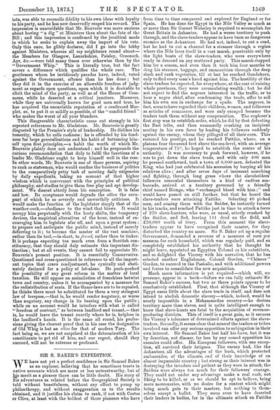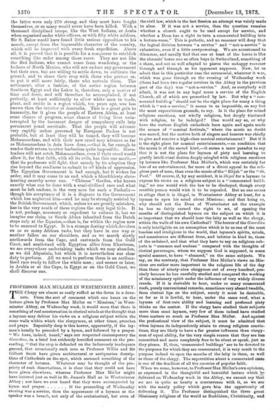SIR S. B AR - FIB'S EXPEDITION.
WE have not yet a perfect confidence in Sir Samuel Baker as an explorei, believing that he sometimes trusts in native accounts which are more or less untrustworthy, but of :ts merit as a pioneer there can be little doubt. His story of iris adventures as related before the Geographical Society is told without boastfulness, without any effort to pump up philanthropy, and without exaggeration as to the results obtained, and it justifies his claim to rank, if not with Cortes or Clive, at least with the boldest of those pioneers who have from time to time conquered and explored for England or for Spain. He has done for Egypt in the Nile Valley as much as or raore than Sir Garnet Wolseley is required to accomplish for Great Britain in Ashantee. He had a worse territory to push through, and the slave-traders appear to have been as dangerous enemies as the Ashantees. He had not, indeed, to cut a road, but he had to cut a channel for a steamer through a region where the Nile loses itself in a vast marsh, penetrable only by the light boats of the slave-traders, who were everywhere ready to descend on any scattered party. This marsh stopped him for a season, and even then it took him four months to drag his steamer, baggage, and ammunition through the deep slush and rank vegetation, till at last he reached Gondokoro, only to find every man's hand against him. The hostility of the slave-traders he expected, for everywhere, at the cost of ruining whole provinces, they were accumulating wealth ; but he did not expect to find the negroes interested in the traffic, or to hear a negro chief, after condemning the trade, offer to sell him his own son in exchange for a spade. The negroes, in fact, mem to have regarded their children, women, and followers as articles of commerce, and were only enraged because the traders took them without any compensation. The explorer's first step was to establish order, which he did by first defeating the Bari tribe, and then summarily crushing an incipient mutiny in his own force by leading his followers suddenly against the enemy, whom they pillaged of all their corn. This restored his prestige, and he reached Fattiko, where, on a plateau four thousand feet above the sea-level, with an average temperature of 75°, he hoped to establish the centre of his authority. It was necessary to push forward, however, if he was to put down the slave trade, and with only 400 men he pressed southward, took a town of 8,000 men, defeated the King, who had just celebrated his accession by burying all his relatives alive ; and after seven days of incessant marching and fighting, through long grass where the slaveholders' followers concealed themselves in a kind of endless am- buscade, arrived at a territory governed by a friendly chief named Rionga, who "exchanged blood with him;" and would have passed on still further, but that he heal the slave-traders were attacking Fattiko. Selecting 40 picked men, and arming them with the Snider, he instantly turned in his tracks, and reached Fattiko just in time to attack a force of 270 slave-hunters, who were, as usual, utterly crushed by the Snider, and fled, leaving 141 dead on the field, and £30,000 worth of ivory. From this moment the slave- traders appear to have recognised their master, for they disturbed the country no more. Sir S. Baker set up a regular Government, demanded a revenue of a measure of corn per mensem for each household, which was regularly paid, and so completely established his authority that he thought he might leave, appointed an Egyptian Colonel as his substitute, and so delighted the Viceroy with his narrative, that he has selected another Englishman, Colonel Gordon, " Chinese " Gordon, to succeed to the Pashalic, and with additional powers and forces to consolidate the new acquisition.
Much more information is yet required—which will, we presume, appear in a book—before we can fully estimate Sir Samuel Baker's success, but two or three points appear to be conclusively established. First, that although the Viceroy of Egypt cares little about the slave trade in itself, and does not intend to abolish domestic slavery—which, indeed, would be nearly impossible in a Mohammedan country—he desires territory more than slaves, and is quite intelligent enough to know that slave-hunts are fatal to the acquisition of revenue- producing districts. This of itself is a great gain, as it secures the Viceroy's tolerance of determined efforts against the slave- traders. Secondly, it seems clear that noneof the traders or tribes involved can offer any serious opposition to subjugation in their own interest. Sir Samuel Baker lost half his force, but it was by desertion, not disease, far less by any armed opposition his enemies could offer. His European followers, with one excep- tion, all survived their fatigues. The enemy had, like the Ashantees, all the advantages of the bush, which protected ambuscades, of the climate, and of their knowledge of an almost impassable country ; but strong as their interest was in destroying the invaders and patient as they were in attack, the ..Sniders were always too much for their followers' courage. They could not under any advantage make a real rush, not liking to be killed, or as we should be apt to believe, being mere mercenaries, with no desire for a contest which might bring much gain to their masters, but nothing to them- selves except a bullet. They seem even to have deserted their leaders in bodies, for in the ultimate attack on Fattiko the latter were only 270 strong, and they must have fought themselves, or so many would never have been killed. With a thousand disciplined troops, like the West Indians, or Arabs when organised under white officers, or with fifty white soldiers, Sir S. Baker would have found little serious opposition to his march, except from the impassable character of the country, which will be improved with every fresh expedition. Above all, it is proved that it is possible for a conqueror to establish something like order among these races. They are not like the Red Indians, who cannot cease from wandering, or the Indiana of North Mexico, who will not endure any government but their own, but are willing to settle down, to cultivate the ground, and to share their crop with those who protect or, to put it still more fairly, those who restrain them. The settlement, after a fashion, of the entire region between Southern Egypt and the Lakes is, therefore, only a matter of time and force, and will therefore be accomplished, if not perfectly, at least sufficiently to allow white men to trade, plant, and reside in a region which, ten years ago, was less known than the interior of Australia. This is a great gain to humanity, for it gives the people of Eastern Africa, at least some chance of progress, some chance of living lives unin- terrupted by the incessant danger of compulsory exile into permanent penal servitude. That the people will advance very rapidly unless governed by European Pashas is not probable, but at least they will be tamed, they will become Mohammedans, and with their new creed may advance as far as Mohammedans in Asia have done,—that is, far enough to render their return to utter barbarism quite impossible. Slave- traders will not catch Mohammedans, even if their creed would allow it, for that faith, with all its evils, has this one merit,— that its professors will fight, that merely by its adoption they rise beyond the readiness to submit to all kinds of oppression. The Egyptian Government is bad enough, but it wishes for order, and it may come to an end, which a bloodthirsty slave- hunting anarchy never can. " Chinese " Gordon, who knows exactly what can be done with a semi-civilised race and what must be left undone, is the very man for such a Pashalic- though his acceptance of it is a disgrace to the Government which has neglected him—and he may be strongly assisted by the British Government, which, unless we are greatly mistaken, has in the very south of these regions the only legal title. It is not, perhaps, necessary or expedient to enforce it, but we imagine our claim to South Africa inherited from the Dutch stops only at the Equator,---that is, far within the region now to be annexed to Egypt. It is a strange destiny which devolves on us so many African tasks, but they have in one way or another fallen on our shoulders, and as we march slowly northwards from the Cape, and eastwards from the Gold Coast, and southward with Egyptian allies from Khartoum, we are everywhere undertaking tasks which we may abandon, as we did Abyssinia, bat which it is nevertheless our clear duty to perform. All we need to perform them is an acclima- tised race ready to follow the white man ; and sooner or later, in Arabia or at the Cape, in Egypt or on the Gold Coast, we shall discover one.











































 Previous page
Previous page